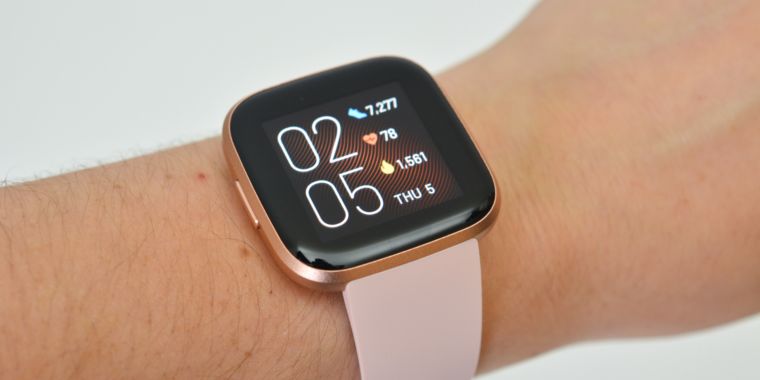
-
The Fitbit Versa 2 smartwatch.Valentina Palladino
-
The $150 Charge 3 has 40% more active screen space than the Charge 2.Valentina Palladino
-
Fitbit's new Inspire HR fitness tracker.Valentina Palladino
-
The Fitbit Versa Lite smartwatch.Valentina Palladino
Reuters has a shocker of a report claiming that Google's parent company, Alphabet, is trying to buy Fitbit.
The report says, "There is no certainty that the negotiations between Google and Fitbit will lead to any deal," and "the exact price that Google has offered for Fitbit could not be learned," but apparently an offer was made.
Fitbit made a name for itself in wearables by producing a popular, cheap, simple fitness tracker. Since 2009, the company has produced simple clips or bracelets that log your activity and sync it to an app. Xiaomi, Huawei, and others eventually started muscling in on Fitbit's turf, though, and the company responded by buying Pebble and producing devices that worked more and more like a full-blown smartwatch. Fitbit faces fierce competition in the smartwatch market, too, though, as over the past few years Apple has made fitness a core part of the Apple Watch. It's no surprise that Fitbit's revenue has been down for three straight years, as the company is getting squeezed at the low end by China and the high end by Apple.
A Fitbit purchase would be Google's second recent acquisition in the wearables space. Earlier in the year, it spent $40 million on a mystery smartwatch technology from Fossil Group that has not gone to market yet. Google's Wear OS has been struggling in the wearables industry; it sits at a distant last place behind the Apple Watch and Samsung's Tizen-powered Galaxy Watch.On the smartwatch side of things, it's not clear how Google's unpopular smartwatch lineup would benefit from the acquisition of Fitbit's unpopular smartwatch lineup. Google's primary wearables issue is sourcing a good SoC that will fit in a smartwatch. Both Apple's and Samsung's watches enjoy a great performance and battery life advantage over anything running Wear OS because Apple and Samsung both have their own chip-design divisions that produce modern smartwatch-centric SoCs. Apple and Samsung are investing in smartwatch hardware, and that hardware gets better every year.
Google doesn't make its own SoCs, so it must rely on an ecosystem of component vendors to produce any kind of hardware. While this works fine for smartphones, the problem is that Qualcomm, the market leader in mobile chips, has never shown a significant amount of interest in the smartwatch market. Qualcomm shoved a Snapdragon 400 into the first Android Wear devices in 2014, and its smartwatch SoCs have basically been stuck in 2014-era technology ever since then. The company has released the "new" Snapdragon Wear 2100 and Snapdragon Wear 3100 over the years, but these two chips and the Snapdragon 400 are all essentially the same thing: four Cortex A7 CPUs built on a 28nm process. Qualcomm smartwatch chips don't get smaller or faster, year over year, while Samsung's and Apple's do. 2014-era chip technology doesn't cut it in 2019, and there's nothing Google can do in the software or hardware design to correct this huge of a disadvantage.
Acquiring Fitbit won't help Google with its hardware problems. The most smartwatchy Fitbits, the Versa line, just use the same off-the-shelf ARM processors Google has access to. Google can't want much from Fitbit's smartwatch OS, either, as almost no one would call it better than Wear OS. Wear OS has more apps and better smartwatch integration on iOS and Android, and plenty of advanced fitness tracking built in.Fitbit is a big brand name in fitness trackers, but at this point it's hard to imagine that the company brings anything unique to the table at the low end either. Fitbit bands have been cloned to death in China, and if Google is really interested in that market, it could just build a Fitbit clone like everyone else does, without Fitbit. It's hard to imagine why Google would want to do that, though, since the whole point of Google smartwatches is to get people to use Google services more. A simple fitness tracker wouldn't help with that goal.
So that leaves... patents? A desperate grab at acquiring any wearable user base at all? Like Google's earlier Fossil technology acquisition, it's not clear how any of this will help Google in the wearables market, where it faces core supply chain issues that block it from even attempting to compete in the smartwatch market.
Listing image by Valentina Palladino
https://arstechnica.com/gadgets/2019/10/googles-parent-company-reportedly-wants-to-buy-fitbit/
2019-10-29 16:34:00Z
52780421509455
Tidak ada komentar:
Posting Komentar